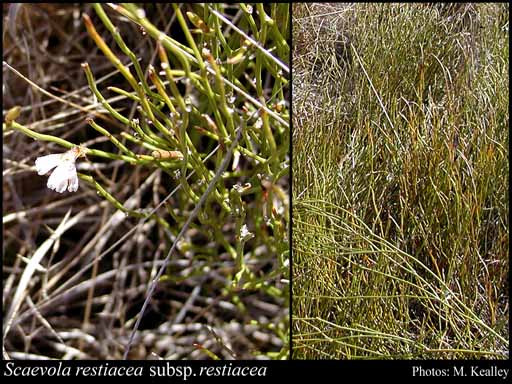- Conservation Code
- Not threatened
- Naturalised Status
- Native to Western Australia
- Name Status
- Current
Erect shrub, 0.15-0.5 m high. Fl. blue-white, Mar or Jun or Aug to Dec. Sandy soils. Undulating plains.

Scientific Description
Stems ribbed. Leaves flat, 15-35 mm long, 3-8 mm wide, Indumentum present, with sparse, simple hairs; margins entire. Bracteoles present, 4-5 mm long, hairy, with simple hairs. Pedicel absent (flowers sessile). Calyx lobes present, Calyx length 1.3-1.5 mm long, hairy, with dense, simple hairs. Corolla mauve, 14-20 mm long, rarely without auricles, not spurred, hairy on the outside, with dense, simple hairs, hairy on the inside; central lobes 3.7-8 mm long, with wings; outer lobes 4-7.5 mm long, wing present on both sides and clearly unequal, 0.3-0.7 mm wide on the narrower side, 0.5-1.1 mm wide on the broader side. Anthers rarely free. Ovary inferior, not gibbose; style 8-10 mm long, hairy; indusium single, hairy; ovules one or two. Flowers in March, June, July, August, September, October, November and December. Occurs in the Murchison (MUR), Coolgardie (COO), Geraldton Sandplains (GS), Avon Wheatbelt (AW) and Mallee (MAL) IBRA Region(s), of the Eremaean (E) and South West (SW) Botanical Province.
Distribution
- IBRA Regions
- Avon Wheatbelt, Coolgardie, Geraldton Sandplains, Mallee, Murchison.
- IBRA Subregions
- Eastern Murchison, Geraldton Hills, Merredin, Southern Cross, Western Mallee.
- Local Government Areas (LGAs)
- Chapman Valley, Dalwallinu, Esperance, Kalgoorlie-Boulder, Kellerberrin, Kondinin, Koorda, Kulin, Lake Grace, Leonora, Menzies, Merredin, Mount Marshall, Narembeen, Perenjori, Sandstone, Yilgarn.